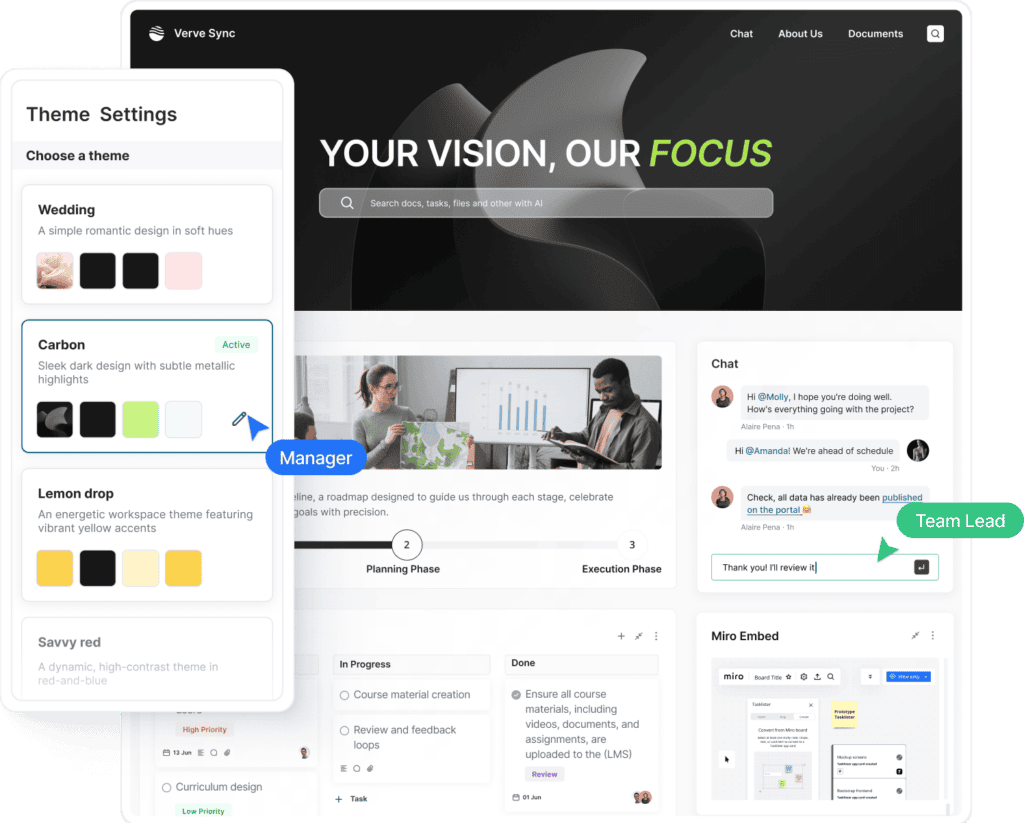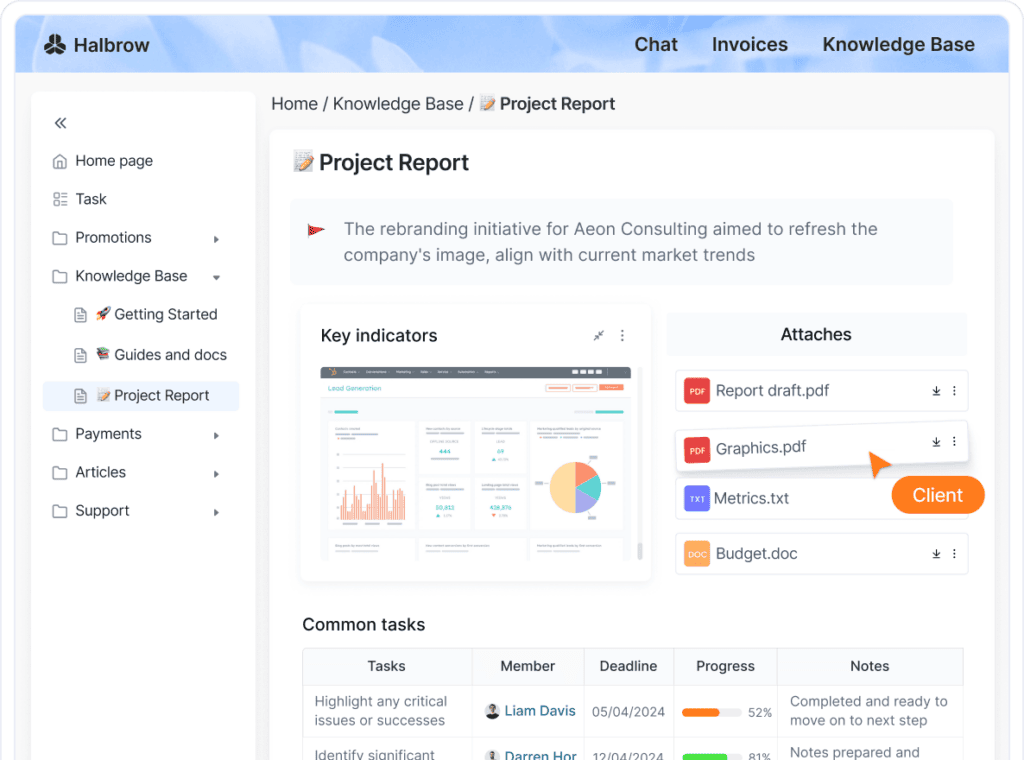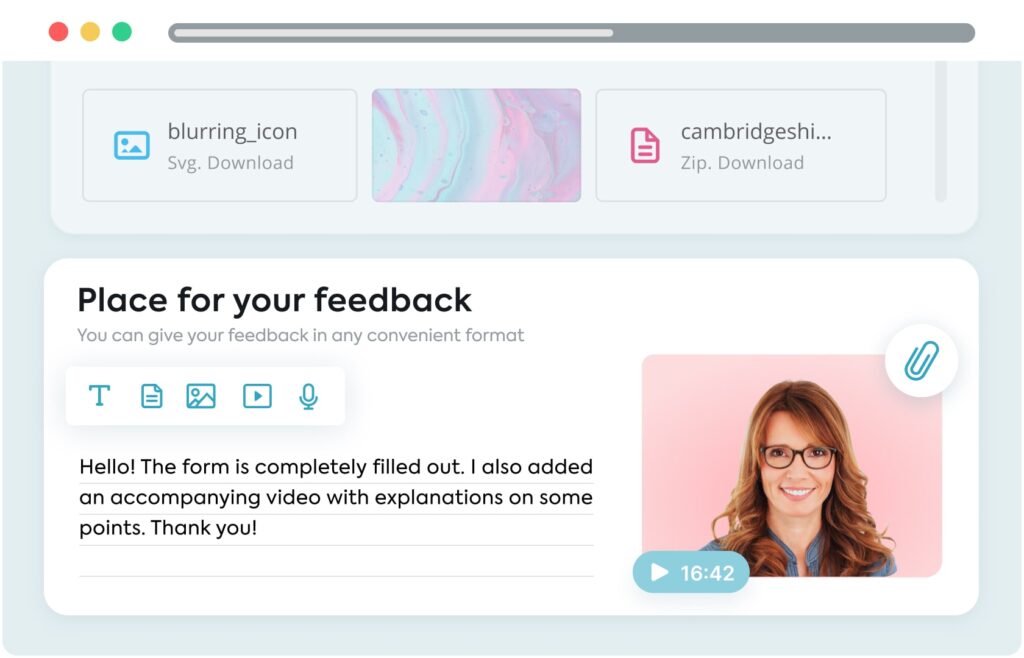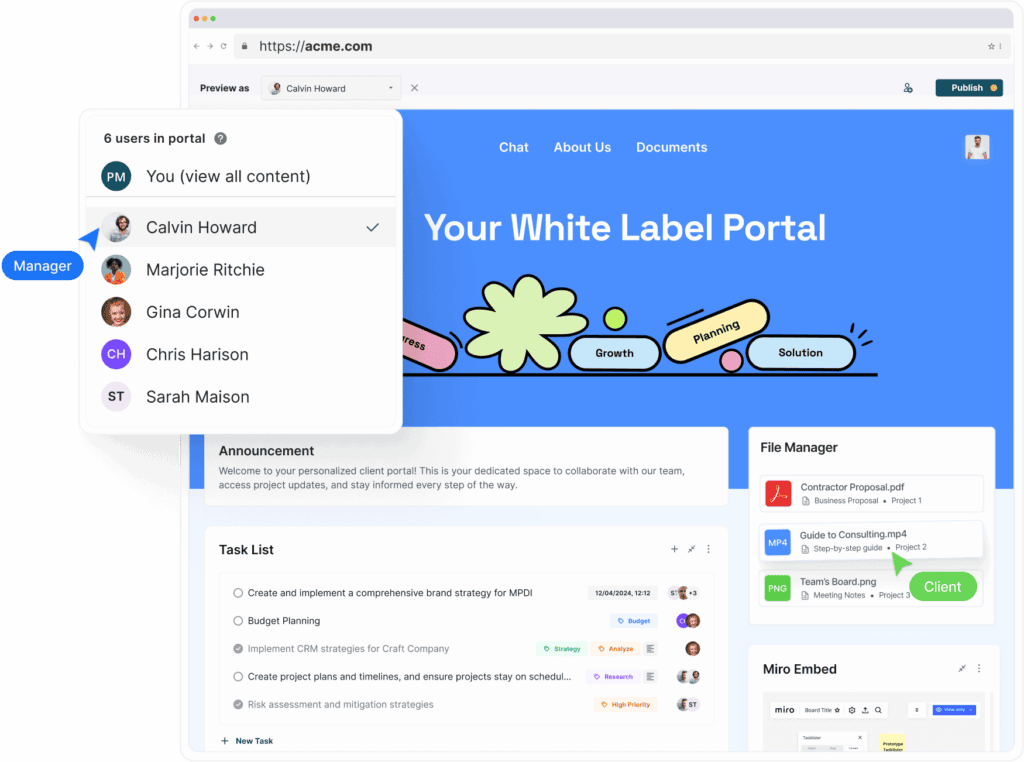
14 Top Client Collaboration Software (Tested and Reviewed in 2025)
- 10 Min read
An important aspect of any successful business is how it communicates with its internal and external clients.
Internal communication is how a company interacts with its employees, while external communication deals with customers.
When done well, it will bring many business benefits and help businesses increase trust with employees and clients.

It’s the way a company interacts with their customers, partners and other stakeholders. It’s fundamental to maintaining an excellent relationship with clients. According to HubSpot’s 2018 “Consumer Customer Support Survey,” 82% of customers expect an immediate response from businesses.
It’s how a company builds trust, receives feedback and improves the product or service they provide. It ensures customers are kept informed, which allows the company to understand their clients’ needs better so they can make more effective decisions.
Its main purpose is to provide updates and respond to queries or change requests in a timely manner. With good communication, a business will increase customer loyalty and have mutual respect between themselves and their customers.
It goes beyond just providing your services. The aim is to keep clients informed, so they never have to be concerned about whether they’re receiving what they paid for.
If you want your company to succeed, you must learn to communicate well with your customers.
If you don’t practice good communication, the risks include:
If you want to protect your reputation, you need to pay more attention to your communication efforts.
According to 2021 statistics, the cost of poor marketing communication stands at $62.4 million per year.
When you communicate to customers the way they want to, they will appreciate you listening to them and they will be more likely to keep using your services.
Here’s why having good client communication practices is important.
If you don’t communicate well, it can lead to missed opportunities, no referrals, lost sales and even lost customers.
Effective communication is important, so clients understand what’s going on and how it affects them. This will help maintain customer loyalty and ensure repeat business.
All clients favor transparency. When they’re kept informed, they will feel valued and appreciated.
When you provide updates and let them know what’s happening, they will respect and trust you more.
They have questions and want problems solved. When you provide information that applies to them, they will appreciate the fact that you’re listening to their concerns, which will give them confidence in you and also show you care about them.
Everyone has different expectations or preferences. They expect things to happen on time.
If they aren’t kept informed, that can cause confusion and frustration. If you come across as not being open and honest, people might take out their frustration by being rude or disrespectful.
Not all clients want to talk to you. They are busy and have other priorities, responsibilities and commitments.
You need to remind them of the value you and your business provide, so they don’t question whether they’re getting value from you.
People will always look for opportunities or reasons to save money. You don’t want to give them a reason to lower your prices by providing a poor service or product.
If you show them the value they’re receiving by spending their money with you, they’ll appreciate the convenience and savings.
The reputation and image of your business plays a part in attracting new customers. If you don’t communicate well with your existing customers, this can tarnish your reputation and generate bad publicity.
One of the best ways to get referrals is to provide excellent service to your customers. This will make them want to give you referrals.
An important aspect of communicating is to clearly articulate what you’ve agreed to provide. Clients should know exactly what they’re paying for and what they’re getting.
When they’re informed about what you’re going to do and when you’re going to do it, you will reduce unexpected surprises.
Part of managing expectations is to set boundaries and ensure they’re respected. It’s not uncommon for people to try and take advantage of others and attempt to get more than they’re willing to pay for.
When you’ve set clear expectations, it’s a lot easier to say “no” to requests you’ve not agreed to, which clients are willing to pay for. This will help avoid conflicts and ensure you maintain a good relationship with them.
Clients who are kept updated regularly are more likely to be satisfied with your services and products.
Many businesses focus a lot on acquiring clients, and once they get them, the level of service they provide can decrease.
When you stay in touch with your clients and exceed their expectations, they will be satisfied and are more likely to provide positive reviews and referrals.
Also, communicating effectively is essential to the success of your business because:

Maintaining client-focused communication is key to a successful long-term relationship and a healthy business.
To improve, you need to develop better communication skills.
When you do, these are some benefits:
Client communication is more than just talking or listening. It is a skill which, when used well, can change how your business operates.
Elements of effective communication include:
Here are five specific steps you can take to improve how you communicate. Use these client communication tips to deliver what customers require and improve the relationships you have with them.
Be clear about your reason for reaching out. Do you want to provide an update, ask for feedback or share an idea that can benefit them?
For example, you may have an idea that can help them with their social media presence, or something that can lead to increased revenue.
Start with the end in mind and let that determine how you will construct your message.
How do you intend to reach your clients? Will it be via email, text, chat message, video, audio message or via a portal?
You need to ensure the communication method you use is what they have agreed to.
Once you know why you want to communicate, prepare an outline for your message.
If it’s a formal communication, use a message template or framework. Ensure you cover the key points you want to make in your template and allow for creativity and flexibility.
If it’s informal, ensure the language you use is appropriate. Usually, the simpler the language used, the easier it is to understand and act on.
Clearly articulate what you want them to do after they have received the communication.
Also, include a deadline by which you want them to complete the action you have requested.
The clearer you are, the higher the chances they will do what you ask them to. This will help prevent false understanding, errors or miscommunications, which can sometimes become bigger issues than they need to be.
Let them know how to contact you if they want further clarity or need more information.
You’re in business because of your clients. If you want to maintain a strong relationship with them and also grow your business, always appreciate them.
Having a personal relationship will go a long way to keeping them long term.
When you create a plan or have a process you follow that supports your business objectives, you will establish a solid foundation for a long-term relationship. It will also help your marketing teams have a consistent approach when dealing with clients.
Here are tips that will help optimize your communication efforts and provide a high level of customer service.

Tailor how you communicate according to your client’s preferences. Factors you need to consider include:
This means getting ahead of any issues and avoiding last-minute surprises. Things always go wrong. You will experience setbacks, which will lead to delays.
Most clients will be okay with delays if they’re informed well ahead of time. This will allow them to create contingency plans with their teams.
All businesses have an internal language that’s relevant only to them. This can include acronyms, project names or internal processes.
Unless it’s relevant to a specific client, avoid using jargon or language that will not make sense to them.
When having an in-person or virtual meeting, ask open-ended questions and listen carefully.
Clients have great ideas that can help your business improve. Use active listening techniques to pay attention to what’s being said.
Follow the golden rule, “Seek first to understand then to be understood.”
Many people do not listen actively because they’re figuring out in their mind what they want to say next.
This can cause them to interrupt a client before they finish speaking. This is something you must avoid.
Allow them to speak and give them plenty of time and space to share what’s on their mind. They will ask questions, and that’s your opportunity to speak and share what you need to.
With some clients, you may have more of a personal relationship. In such cases, you can have fun, share jokes and be more personal.
With others, it’s strictly business. This is another reason knowing each client well is important because you will have a better idea about the best way to communicate with them.
When someone shows their frustration, maintain your composure. Be polite and show your professionalism. Take nothing personally, because it’s never about you. They just want to receive what they expect.
Whenever you smile, it makes you feel better and also has the same effect on others.
If a client is having a tough day, a smile can help them relax and not take things too seriously.
Smiling will also help you stay positive if you’re experiencing a stressful situation.

An effective way to keep clients engaged is by asking them for their ideas and input. They usually have valuable ideas that can help improve the service you provide.
You can formalize the process by making providing feedback or accepting requests part of your update.
If a client does not share feedback, you can help them by asking specific questions related to something they do or something they know.
Clients want to know what to expect, so tell them what you are going to do.
As an example, you might say, “I will send you the data report or the marketing communication and social media plan by the end of the week.”
This will help them know what’s coming and will also give them time to prepare.
If you have promised them something, follow through.
Clients appreciate companies that have a positive culture or attitude. A simple way you can show this is by saying thank you.
Sending a simple thank you note or email will go a long way towards maintaining a solid relationship with them.
When they know you appreciate them and value their business, they will often support you.
According to HubSpot Research, when companies offer excellent customer service, 93% are likely to make repeat purchases.
Given the amount of communication you have with your clients on a daily basis, there is always the human factor of someone forgetting to send an email or not wanting to write over and over an update. That’s why the client portal for communication between you and your clients is a hot topic today.
How can it help you provide better client communication and strengthen business relationships? Here are some benefits of using a client portal for your communication strategy:

The method you use to communicate is important. It should make it easier for everyone involved.
The FuseBase is an effective tool you can use for your communication and the benefits include:
Improve your client communication with FuseBase!
Found it useful? Share the article with your community
Get weekly tips and insights on how to grow your business